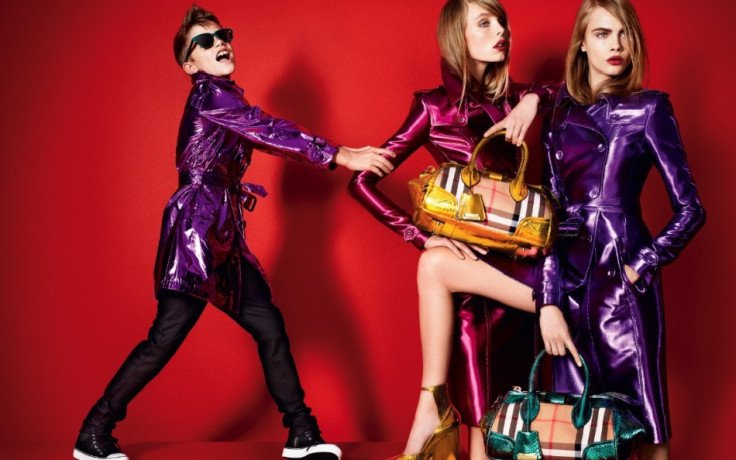Burberry Condemned for 'Cruel' £22,000 Peacock-Feather Coat

The luxury clothing company Burberry, whose advertising features David Beckham's 10-year-old son Romeo, has become mired in controversy after accusations that the British fashion label continues to profit from cruelty to animals.
Burberry has admitted using peacock feathers sourced from China in the manufacture of a coat that is the flagship item in its spring/summer collection, and costs £22,000.
Animal rights charity Peta condemned the British label after its initial claim that the feathers came from India was exposed as untrue.
The export of peacock feathers is banned in India, where one prominent member of the Indian parliament, Maneka Gandhi, this week called for an immediate investigation.
"Peacocks are killed in their thousands in India and smuggled abroad to be made into fashion accessories," said Gandhi.
"Regardless of how they are collected, it's unethical to wear them as it encourages illegal trade."
Burberry has been forced to issue a clarification. It now admits the feathers were actually sourced from China, where the cruelty of factory farming, and the practice of ripping feathers from live birds, has attracted international condemnation.
The company has previously insisted that it does not "use down or feathers if there is any concern that it has been produced using unacceptable treatment of animals".
Animal rights charity Peta condemned the company's "long track record of promoting cruelty to animals".
"The Burberry brand may be well known for its plaids, but what it should be known for is a long track record of promoting cruelty to animals, drowning, strangling and electrocuting animals on factory fur farms and now paying to have feathers ripped out of peacocks' sensitive skin by the fistful," said a Peta spokesman.
In 2009, Chinese suppliers were found to be routinely involved in the practice of "live plucking" the feathers from geese, leaving the birds with open flesh wounds.
Down hand-stripped from live birds fetches a higher price as the quality of feathers picked from carcasses deterioriates quickly.
Romeo Beckham made his modelling debut in Burberry's spring/summer 2013, in a campaign shot by fashion photographer Mario Testino.
As part of the publicity surrounding the campaign, Christopher Bailey, the label's chief creative officer, gave an interview in which he called Romeo "a joy to work with", and said he "really stole the show".
"This season's campaign lights up with the infectious energy of an amazing young cast of old and new Burberry family," said Bailey.
"We had such fun shooting the campaign and I think that comes through in the images, which really reflect the upbeat spirit of the collection."
A spokesman for Victoria Beckham defended the star after her new handbag collection was also criticised for using crocodile skin, lizard skin and calf leather in its purses.
"These skins sit strictly within the Convention on International Trade in Endangered Species regulations, and are monitored at every step of production," said Beckham's spokesman.
"The skins are farmed in America under very tight guidelines."
Burberry's website initially stated its controversial coat, worn recently by American Vogue editor Anna Wintour, was made using "100 per cent farmed golden peacock feathers, India".
The company subsequently issued a clarification, saying it had not acted illegally since the feathers were actually sourced from China, rather than India.
From China, they were sent to a dealer in New York, before being exported to India, where seamstresses sewed them on to fabric. The coats were then exported to Italy, according to Burberry, where fashion company Zamasport put the finishing touches to the garment, making them ready for their appearance on the London catwalk.
A Burberry spokeswoman said: "We have policies in place with all our suppliers designed to ensure the highest standards of ethical trading throughout our business. Burberry's terms and conditions of purchase that govern our relationship with vendors require them and their subcontractors to comply with the Ethical Trading Policy as well as compliance with all local labour and environmental laws.
"A very limited number of items has been made using peacock feathers. This is not mass production, nor is Burberry encouraging widespread use."
Swedish furniture corporation IKEA cancelled an order for down-filled furniture from China after discovering the down came from live-plucked birds.
China's peacock farms can contain flocks of up to 10,000 birds, with each peacock typically kept with four or five peahens in a five square metre pen. At seven months, each bird is packed into a tiny bamboo cage and sent for slaughter.
Chinese farms offer the feathers, if bought in bulk, for as little as 10 pence each.
"Anyone with an ounce of compassion should steer clear of these products and opt for any of the many fabulous, humane, synthetic fashions available," the Peta spokesman said.
© Copyright IBTimes 2025. All rights reserved.



















